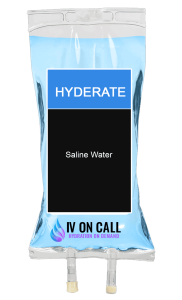This IV therapy combines hydration with specific nutrients and compounds: Vitamin B-12, Vitamin C, Glutathione, and NAD (Nicotinamide Adenine Dinucleotide). It's sometimes referred to as a "cocktail" or "drip" in wellness contexts.

- Hydration Base: Typically saline solution (0.9% sodium chloride)
- Vitamin B-12 (Cobalamin):
- Essential for nerve function, DNA synthesis, and red blood cell formation
- IV dose typically ranges from 1000-5000 mcg
- Vitamin C (Ascorbic Acid):
- Antioxidant supports immune function and collagen synthesis
- IV doses can range from 1-25 grams or more
- Glutathione:
- Powerful antioxidant supports detoxification processes
- Typical IV doses range from 600-2400 mg
- NAD+ (Nicotinamide Adenine Dinucleotide):
- Coenzyme involved in cellular energy production and DNA repair
- IV doses can range from 250-1000 mg
- Enhanced hydration
- Increased energy and reduced fatigue
- Improved immune function
- Antioxidant support
- Cellular repair and anti-ageing effects
- Detoxification support
- Improved mood and cognitive function
- Typically administered in outpatient clinics or wellness centers
- Duration can range from 30 minutes to several hours, depending on the protocol
- Usually given via a slow IV drip
- Efficacy: While each component has known physiological roles, the efficacy of combined IV administration for wellness purposes is not well-established in scientific literature.
- Safety concerns:
- Risk of infection at the injection site or in the bloodstream
- Potential for allergic reactions
- Possibility of vein irritation or damage
- Risk of fluid overload in susceptible individuals
- Interactions: May interact with certain medications or medical conditions
- Contraindications: Not suitable for all individuals, particularly those with certain heart, kidney, or liver conditions.
- Not FDA-approved as a combined therapy for any specific condition
- Individual components are FDA-approved for specific medical indications
- Often considered a complementary or alternative therapy
- Limited robust clinical trials on this specific combination
- Individual components have varying levels of evidence for different uses
- More research needed to establish efficacy and optimal protocols
- Headache, nausea, or dizziness (often temporary)
- Vein inflammation or bruising at the injection site
- Allergic reactions (rare but possible)
- Electrolyte imbalances if administered incorrectly
- Potential oxidative stress with high-dose vitamin C in certain individuals
- Should be administered under the supervision of a licensed healthcare provider
- Informed consent is crucial, including discussion of potential risks and limitations of evidence
